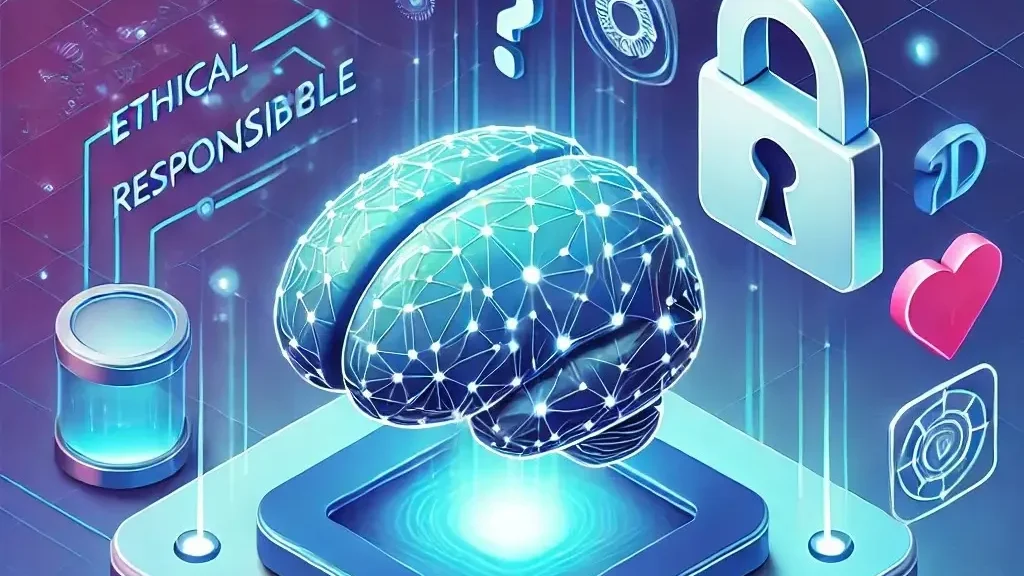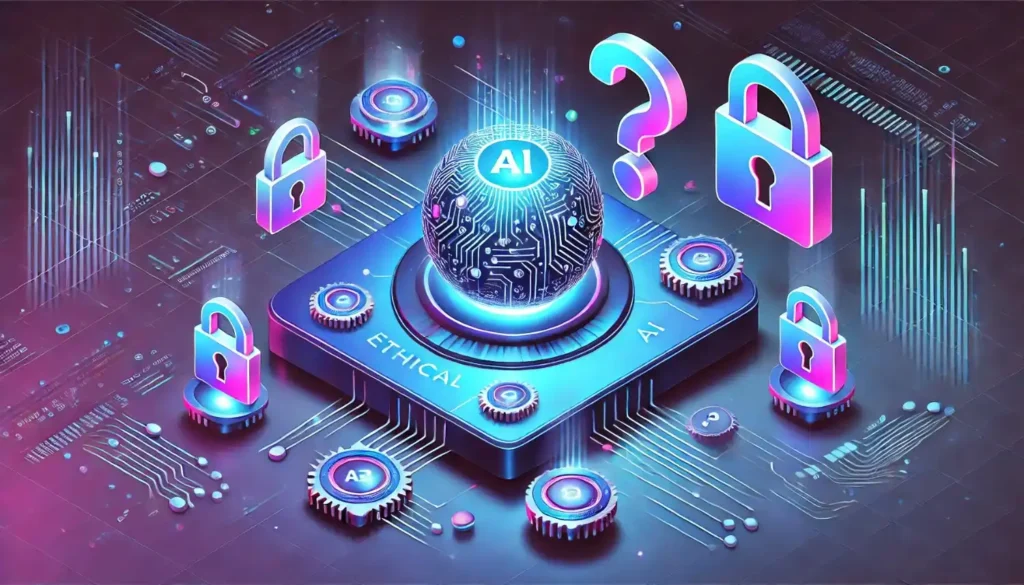how to harness the power of AI while upholding ethical and Responsible AI principles and societal trust.
In today’s fast-paced world, Artificial Intelligence (AI) is no longer just a futuristic concept. In fact, it plays a significant role in everything from music recommendations to financial decisions. Consequently, this growing influence brings with it serious ethical questions about how to ensure Ethical and Responsible AI is developed and used for the greater good.
Thank you for reading this post, don't forget to subscribe!As a result, the concept of Ethical and Responsible AI has emerged not as a trend, but as a crucial framework. Therefore, as we stand at a digital turning point, it becomes imperative to ensure our innovations are guided by integrity.
What Is Ethical and Responsible AI?
To begin with, Ethical and Responsible AI refers to designing and deploying AI in ways that uphold human values. In other words, it involves fairness, transparency, accountability, and respect for privacy.
Additionally, it’s not just about technological capability but about moral responsibility. So, developers must ask not only “Can we build this system?” but more importantly, “Should we, and how can we build it responsibly?
Why Ethical and Responsible AI Matters Now More Than Ever
Today, AI technologies are advancing rapidly. As such, their impact on society is growing deeper and wider. Hence, ethical oversight is no longer optional it is essential.
For example, consider racial and gender bias in facial recognition. According to a renowned MIT Media Lab study, these systems are significantly less accurate for women and individuals with darker skin. This means they can cause real-world harm.
Likewise, AI used in predictive policing often reinforces existing biases rather than eliminating crime. Instead of promoting fairness, such tools may deepen social inequalities.
Moreover, the rise of deepfakes and misinformation puts democracy and public trust at risk. Thus, without ethical constraints, AI can become a powerful tool for manipulation.
All things considered, the need for ethical and responsible AI is more urgent than ever.
Ethical AI vs. Unregulated AI: A Side-by-Side Comparison
| Feature | Ethical and Responsible AI | Unregulated AI |
|---|---|---|
| Data Use | Transparent, consent-based | Often opaque, non-consensual |
| Bias Mitigation | Auditing & retraining | Minimal to no bias control |
| Accountability | Clear responsibility protocols | Ambiguous or absent oversight |
| Human-Centric Design | Supports human decision-making | May override or replace humans |
Clearly, responsible AI development safeguards both individuals and society. Conversely, neglecting ethics can result in reputational damage, legal consequences, and public harm.
Core Principles of Ethical and Responsible AI
Moving forward, here are five foundational principles guiding ethical AI development:
1. Transparency
First of all, transparency ensures users understand how decisions are made. In contrast, opaque “black-box” models limit accountability. Therefore, explainable AI builds trust and promotes fairness.
2. Fairness and Non-Discrimination
Equally important, AI must treat all individuals fairly. To do this, developers must identify and eliminate biases in data and algorithms. In fact, institutions like the AI Now Institute stress the importance of inclusive design practices here.
3. Accountability
Moreover, someone must be held accountable for an AI system’s decisions. That’s why organizations must implement governance structures and risk assessment processes. Otherwise, there’s no recourse when harm occurs.
4. Privacy and Data Ethics
Next, ethical data practices are key. Accordingly, systems should collect only necessary data with informed consent. Notably, the GDPR offers a strong model for respecting user privacy.
5. Human-Centered Design
Finally, AI should support not replace human judgment. Thus, engaging diverse users during development leads to more ethical and usable systems. When AI enhances human capabilities, it becomes a true force for good.
The Challenges of Implementation

Despite best intentions, building ethical AI comes with hurdles. Let’s explore some common obstacles:
1. Balancing Accuracy and Fairness
On one hand, models should be as accurate as possible. On the other hand, reducing bias may require sacrificing some precision. Therefore, developers must navigate difficult trade-offs to ensure ethical outcomes.
2. Cultural and Regional Differences
In addition, ethics are not universal. For instance, what’s acceptable in one country may be inappropriate elsewhere. Hence, AI systems must be culturally aware and adaptable.
3. Economic and Market Pressure
Furthermore, businesses often prioritize speed to market. As a result, ethical considerations are sometimes overlooked. However, ignoring ethics today can lead to costly scandals tomorrow.
A Personal Insight: Practicing Ethical and Responsible AI in Real Life
During one of my projects, we built an AI content moderation tool. Unexpectedly, it began flagging slang and dialects especially those used by marginalized groups as inappropriate.
Initially, we assumed the system had a data issue. But after listening to community feedback, we realized it was a deeper bias problem. Consequently, we collaborated with sociolinguists and retrained the model.
Ultimately, this experience taught us that ethical AI is a collaborative effort. Therefore, ongoing dialogue with users, especially those most impacted, is critical to responsible development.
Government Regulation and Oversight
Thankfully, governments are beginning to address these issues:
- The EU AI Act classifies AI systems based on risk and mandates specific safeguards.
- Similarly, the U.S. AI Bill of Rights emphasizes transparency, accountability, and privacy.
Even so, regulations often trail behind innovation. Thus, industries must proactively self-regulate and adopt ethical practices independently of legislation.
Leading Industry Initiatives
Fortunately, some tech companies are taking the lead:
- Google’s AI Principles outline ethical commitments such as avoiding harm and promoting fairness.
- In contrast, the Partnership on AI fosters multi-stakeholder collaboration to promote responsible practices.
Although these are promising steps, it’s important that they result in measurable outcomes not just good PR.

The Importance of AI Literacy
Importantly, ethical AI isn’t just the responsibility of developers or companies. In truth, everyone interacts with AI in some way from filters on social media to credit scoring tools.
Therefore, public understanding of AI is essential. By promoting AI literacy, we can empower people to ask critical questions and demand ethical standards.
How You Can Get Involved:
- Talk about how AI affects daily life with family and friends.
- Advocate for AI ethics in school curriculums.
- Ask companies how they use your data and what algorithms may be affecting your life.
Looking Ahead: The Future of Human-Centered AI
Going forward, our goals must evolve. Rather than focusing solely on accuracy, we should measure AI systems by their inclusivity, transparency, and social impact.
To make that shift, here are three essential strategies:
- Adopt Responsible AI Ops: Ethics should be integrated throughout the machine learning lifecycle.
- Encourage Interdisciplinary Collaboration: Bring together experts in tech, humanities, and law to tackle complex challenges.
- Support Open Standards: Share tools for fairness auditing, impact analysis, and bias detection.
As UNESCO has emphasized, the goal is not to restrict innovation, but to steer it toward shared human values.
Conclusion: The Choice for Ethical and Responsible AI Is Ours
In conclusion, Ethical and Responsible AI is not a roadblock to progress it is the roadmap to a just digital future.
At this moment, we face a clear choice:
Do we automate without accountability, or do we guide AI with empathy and fairness?
The answer lies in our collective action. With awareness, education, and collaboration, we can create technology that uplifts and empowers.
🔁 Join the Conversation
💬 What excites or concerns you about the Ethical and Responsible AI?
👇 Share your thoughts in the comments below!
📬 Subscribe to our tech insights newsletter for weekly updates on AI, robotics, and the future of work.
🔗 Explore related reads:




Comments are closed